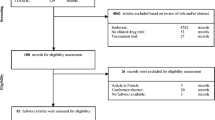Abstract
Pharmacological research in the adolescent population is not meeting adolescents’ needs. Medication is still frequently prescribed off label, and studies especially in sensitive areas of adolescent health care are underrepresented. Adolescents did not benefit from the new knowledge gained in cancer research, and their outcome has essentially not improved during the last two decades in comparison to younger children and adults. There are many obstacles that make it challenging to enroll adolescents in pharmacological research. Access can be difficult. Confidentiality plays an essential role for minors and may be a hindrance, notably to studying sexual and mental health matters. Pharmaceutical companies may exclude the adolescent patient because of a lack of profit and in fear of a complex study design. Research concepts should be explained to the adolescent in a comprehensive manner, and assent and consent forms should be clear and understandable. New laws and incentives have been developed to encourage pharmaceutical companies to engage adolescents in their research projects. Centralization and collaboration of all parties involved may make the whole approach to adolescent research more efficient and uniform. The mature minor doctrine has facilitated the enrollment process. Parental consent may be waived for low-risk medical trials to promote recruitment. Ethics committees therefore play a major role in protecting the adolescent from harm from participating in research. In conclusion, pharmacological research in adolescents has to be encouraged. This will increase the safety of current medical treatment regimens and will allow this population to benefit from therapeutic advancements.
Similar content being viewed by others
References
Beecher HK. Ethics and clinical research. N Engl J Med. 1966;274:1354–60.
Pandolfini C, Bonati M. A literature review on off-label drug use in children. Eur J Pediatr. 2005;164:552–8.
Policy statement of the Committee on Drugs (lead author Neville K). Off-label use of drugs in children. Pediatrics. 2014;133(3):563–7.
Abdel-Rahman SM, Amidon GL, et al. Summary of the National Institute of Child Health and Human Development—Best Pharmaceuticals for Children Act Pediatric Formulation Initiatives Workshop—Pediatric Biopharmaceutics Classification System Working Group. Clin Ther. 2012;34:S11–23.
Moore LW, Miller M. Initiating research with doubly vulnerable populations. J Adv Nurs. 1999;30(5):1034–40.
Conroy S, McIntyre J, Choonara I, Stephenson T. Drug trials in children: problems and the way forward. Br J Clin Pharmacol. 2000;49:93–7.
Blake DR, Lemay CA, Kearney MH, Mazor KM. Adolescents’ understanding of research concepts: a focus group study. Arch Pediatr Adolesc Med. 2011;165(6):533–9.
Ford C, English A, Sigman G. Confidential health care for adolescents: position paper for the Society for Adolescent Medicine. J Adolesc Health. 2004;35:160–7.
Vitiello B. Research in child and adolescent psychopharmacology: recent accomplishments and new challenges. Psychopharmacology. 2007;191:5–13.
Dawes MA, Johnson BA. Pharmacotherapeutic trials in adolescent alcohol use disorders: opportunities and challenges. Alcohol Alcohol. 2004;39(3):166–77.
Koelch M, Schnoor K, Fegert JM. Ethical issues in psychopharmacology of children and adolescents. Curr Opin Psychiatry. 2008;21(6):598–605.
Hazell P, O’Connell D, Heatycote D, Henry D. Tricyclic drugs for depression in children and adolescents. Cochrane Database Syst Rev. 2002; 2:CD002317.
Sandler AD, Bodfish JW, et al. Lack of benefit of a single dose of synthetic human sceretin in the treatment of autism and persuasive developmental disorder. N Engl J Med. 1999;341:1801–6.
Tai E, Bleyer A, et al. Clinical trial enrollment among adolescents with cancer. Pediatrics. 2014;133:S3.
Food and Drug administration (FDA). 1998. 21 CFR Parts 201, 312, 314 and 601. Regulations requiring manufacturers to assess the safety and effectiveness of new drugs and biological products in pediatric patients, Part II, Final Rule. Fed Register 63 (Dec.2): 66632–72.
Wimmer S, Rascher W, McCarthy S, Neubert A. The EU paediatric regulation: still a large discrepancy between therapeutic needs and approved paediatric investigation plans. Pediatr Drugs. 2014;16:397–406.
West Virginia Supreme Court. Belcher v. Charleston Area Medical Ctr. 1992; 422 S.E.2d 827.
Partridge BC. The decisional capacity of the adolescent: an introduction to a critical reconsideration of the doctrine of the mature minor. J Med Philos. 2013;38:249–55.
Wilhelms EA, Reyna VF. Fuzzy trace theory and medical decisions by minors: differences in reasoning between adolescents and adults. J Med Philos. 2013;38:268–82.
Iltis AS. Parents, adolescents, and consents for research participation. J Med Philos. 2013;38:332–46.
Cherry MJ. Ignoring the data and endangering children: why the mature minor standard for medical decision making must be abandoned. J Med Philos. 2013;38:315–31.
Sanci LA, Sawyer SM, Weller PJ, Bod LM, Patton GC. Youth health research ethics: time for a mature-minor clause? MJA. 2004;180:336–8.
Kauffman RE. Clinical trials in children. Problems and pitfalls. Pediatr Drugs. 2000;2(6):411–8.
Wendler D. A new justification for pediatric research without the potential for clinical benefit. Am J Bioeth. 2012;12(1):23–31.
Schenk K, Ngcozela N, et al. Enrollment of adolescents aged 16–17 years old in microbicide trials: an evidence-based approach. J Adolesc Health. 2014;54(6):654–62.
Brody JL, Annett RD, Scherer DG, Perryman ML, Cofrin KMW. Comparisons of adolescent and parent willingness to participate in minimal and above-minimal risk pediatric asthma research protocols. J Adolesc Health. 2005;37:229–35.
Roberts LW, Lauriello J, Geppert C, Keith SJ. Placebos and paradoxes in psychiatric research: an ethics perspective. Biol Psychiatry. 2001;49:887–93.
Baker JN, Kodish ED, et al. Suggestions from adolescents, young adults, and parents for improving consent in phase 1 Pediatric Oncology trials. Cancer. 2013;119:4154–61.
Smyth RL. A risk adapted approach to the governance of clinical trials. BMJ. 2011;343:d6756.
Acknowledgments
E. Welisch and L.A. Altamirano-Diaz declare no relevant conflicts of interest. No sources of funding were used to support the writing of this manuscript.
Author information
Authors and Affiliations
Corresponding author
Additional information
This article is part of the topical collection on Ethics of Pediatric Drug Research.
Rights and permissions
About this article
Cite this article
Welisch, E., Altamirano-Diaz, L.A. Ethics of Pharmacological Research Involving Adolescents. Pediatr Drugs 17, 55–59 (2015). https://doi.org/10.1007/s40272-014-0114-0
Published:
Issue Date:
DOI: https://doi.org/10.1007/s40272-014-0114-0



